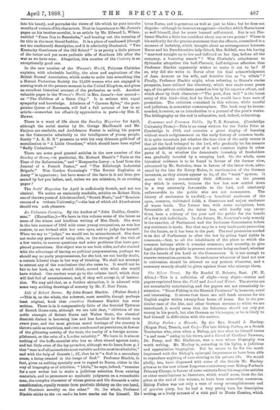Life of Robert Burns. By John Stuart Blackie. (Walter Scott.)
—This is, on the whole, the soberest, most sensible, though perhaps least original, book that emeritus Professor Blackie has ever written. There is in it comparatively little of the frenzied Tyrtams of Scotch Home-rule, although we are told that, "oblivious of the noble example of Robert Barns and Walter Scott, the classical Scottish dialect is becoming less and less familiar to Scottish ears every year, and the most glorious moral heritage of the country is thrown aside as worthless, and even condemned as pernicious, in favour of the glittering novelty of the hour, the vanity of a foreign accom- plishment, or the echo of a London notoriety." We have in it almost nothing of the buffo-moralist who has so often sinned against taste, and but little even of the lay-preacher, although we do learn from p.1 that man is of all animals the most variable and the most incalculable," and with the help of Genesis i., 27, that he is "a God in a secondary sense, a being created in the image of God." Professor Blackie, in fact, gives us nothing specially new in regard to Burns, either in the way of biography or of criticism. "Little," he says, indeed, "remains for a new writer but to make a judicious selection from existing materials, and to pronounce an equitable judgment on a remarkable man, the complex character of whose genius and life demands a calm consideration, equally remote from patriotic idolatry on the one hand, and Pharisaic severity on the other." On Lhe whole, Professor Blackie sticks to the via media he here marks out for himself. He
loves Barns, and is generous as well as just to him ; but he does not disguise—although he does not exaggerate—the fact which Burns knew so well himself, that he never learned self-control. But is not Pro- fessor Blackie a little too confident about one or two points ? Where is his authority for the precise statement that the offence, committed in a moment of inebriety, which brought about an estrangement between Burns and his Dumfriesshire lady-friend, Mrs. Riddell, was his having "marched straight up to her and inflicted on her lips, before all the company, a bouncing smack"? Was Clarinda's attachment to Sylvander altogether the half-Platonic, half-religioas affection that Professor Blackie apparently wishes to make it out to be ? If so, why did she write to Burns after his final acknowledgment of Jean Armour as his wife, and describe him as "a ? Finally, Professor Blackie might, when referring to Burns's excise prospects, have utilised the discovery, which was made some years ago, of the private criticisms passed on him by his superior officer, and which show by their character—" The poet, does well" is the latest entry of this kind—that, had he lived, he would have been sure of promotion. The criticism contained in this volume, while careful and judicious, is somewhat commonplace. The book may be recom- mended, however, as an introduction to a perusal of the poet's works. The bibliography at the end is exhaustive, and, indeed, exhausting.


































 Previous page
Previous page